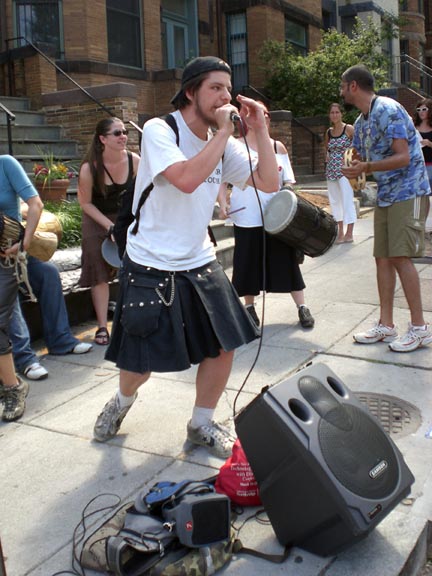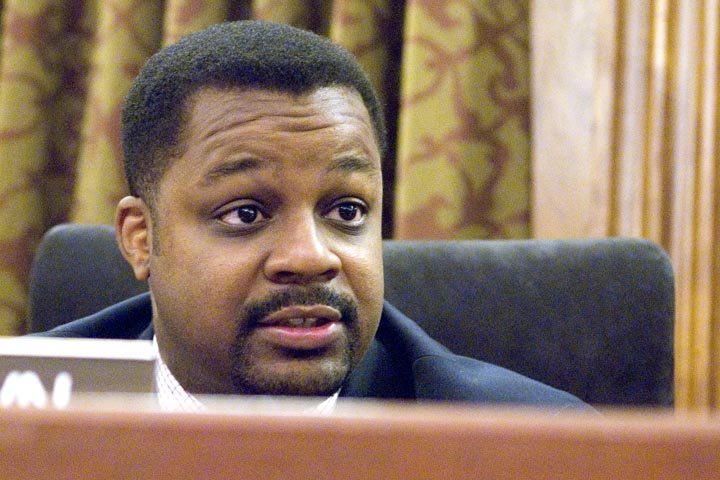Another Advocacy Group's Noise Video
Labels: Video
Documenting a community’s quest for the right to peace and quiet near H Street Northeast in Washington, D.C.
Labels: Video
 Members of the D.C.-based Guerilla Poets Insurgency get loud during the June 24 Amplified Free Speech Day in Adams Morgan. The poet group’s amplifiers actually were louder than the one rented by the 8th and H Street NE neighbors. (CLICK TO ENLARGE Photo Copyright © 2007. David Klavitter)
Members of the D.C.-based Guerilla Poets Insurgency get loud during the June 24 Amplified Free Speech Day in Adams Morgan. The poet group’s amplifiers actually were louder than the one rented by the 8th and H Street NE neighbors. (CLICK TO ENLARGE Photo Copyright © 2007. David Klavitter)July 23, 2007
Ms. Cynthia Brock-Smith
Secretary to the Council
John A. Wilson Building, Room 5
1350 Pennsylvania Avenue, N.W.
Washington, D.C. 20004
VIA FACSIMILE (202-347-3070)
RE: ANC 6C Supports Bill 17-177, "Noise Control Protection Amendment Act of 2007"
Dear Ms. Brock-Smith:
At Advisory Neighborhood Commission 6C’s duly noticed, rescheduled monthly meeting on July 18, 2007, with a quorum of seven Commissioners present, ANC 6C considered the matter of Bill 17-177, the "Noise Control Protection Amendment Act of 2007". After hearing testimony, community comments and discussion, the ANC 6C Commissioners voted unanimously to support Bill 17-177.
ANC 6C fully supports freedom of speech, whether in one’s home, businesses or in the public space. However, there are practical limits with respect to how free speech should be permitted to impact other residents and passers-by. Speech (or any kind of expression for that matter) should absolutely be protected where the sound is unamplified. Amplified speech above certain levels, however, poses a direct harm to the peace, safety and rights of others, and should not be tolerated.
We strongly endorse the U.S. Supreme Court’s 1949 decision in the case of Kovacs v. Cooper: "The unwilling listener is not like the passer-by who may be offered a pamphlet in the street but cannot be made to take it. In his home...he is practically helpless to escape this interference with his privacy by loudspeakers except through the protection of the municipality."
Until 2001, the District of Columbia provided this necessary protection with respect to non-commercial speech, and continues to this day to provide protection with respect to commercial speech. The result of this change has been disasterous for our communities—residents and individuals walking the sidewalks are regularly subjected to amplified speech, up to and including the levels which one would find at a rock concert. This often happens for hours on end, forcing unacceptable noise levels on individuals, whether they want it or not. For residents in particular, there literally is no escape short of being forced from one’s home.
The Council must act now to remedy this unacceptable situation.
It is important to realize that unamplified speech is and would remain exempt from the District's noise ordinance [DCMR § 20-2704.8]. This provision provides a proper balance between the fundamental rights of both free speech and every individual’s right to peace, order and quiet enjoyment. Bill 17-177 will resolve a serious health and safety matter for all District of Columba residents and businesses, while upholding free speech rights.
ANC 6C wants to protect the homes, businesses and families that call our great neighborhood home from unlimited decibels of noise. Furthermore, the ANC urges the Council to include these enhancements to the bill:
1. Measured Distance. Limit sound to a level that does not inhibit residents' quiet enjoyment of their homes. Much of our neighborhood is mixed between commercial and residential uses, with each use closely adjoining the other. The 50 foot provision for measuring sound at 70 dB(A) is simply not enough protection. The Act should be amended to state: "50 feet or the closest occupied building".
2. Maximum Sound Level. The Environmental Protection Agency (EPA) established a maximum level for outdoor activity interference and annoyance is 55 dB(A) outdoors and 45 dB(A) indoors. These are the maximum levels that still permit spoken conversation and comfort in the activities of daily living. A permitted level greater than 55 dB(A) actively harms the hearing of our residents—an unacceptable health threat to the neighbors living within our ANC, and the District as a whole. The Act be amended stating the maximum sound level be no higher than 55 dB(A).
3. Tools, Training and Enforcement. The relatively few sound level meters available for enforcement in the District are all owned by the Department of Consumer and Regulator Affairs (DCRA). Additional meters should be funded and training should be provided to DCRA inspectors and Metropolitan Police Department (MPD) personnel. The Act should be amended to provide enforcement powers to both DCRA and MPD.
The District of Columbia Attorney General researched major municipal noise ordinances and determined that Bill 17-177 strikes an appropriate balance between free speech rights and rights to quiet enjoyment of property, and is constitutional. It is a good bill, and necessary to protect the residents of our great city.
Thank you for taking the position of ANC 6C into account and according our input the great weight to which it is entitled under District law.
Sincerely,
Karen J. Wirt
Chairperson
ANC 6C
Cc: Council Chairman Vincent C. Gray (fax 202-724-8097)
Ward 1 Councilmember Jim Graham (fax 202-724-8109)
Ward 2 Councilmember Jack Evans (fax 202-724-8023)
Ward 3 Councilmember Mary M. Cheh (fax 202-724-8118)
Ward 4 Councilmember Muriel Bowser (fax 202-741-0908)
Ward 5 Councilmember Harry Thomas, Jr. (fax 202-724-8076)
Ward 6 Councilmember Tommy Wells (fax 202-724-8054)
Ward 7 Councilmember Yvette Alexander (fax 202-741-0911)
Ward 8 Councilmember Marion Barry (fax 202-724-8055)
At-Large Councilmember Kwame R. Brown (fax 202-724-8156)
At-Large Councilmember David A. Catania (fax 202-724-8097)
At-Large Councilmember Phil Mendelson (fax 202-724-8099)
At-Large Councilmember Carol Schwartz (fax 202-724-8071)
 (CLICK TO ENLARGE) Brilliant sunshine bathes a plastic Madonna hanging from a traffic signal on the southeast corner of H and 8th Streets NE on April 29, 2006. The symbol hangs within yards and in plain view of residential homes where people of all races and sexual orientation live. It is part of the Saturday ranting by the men from the Israelite School of Universal Practical Knowledge (ISUPK) (Copyright © 2006. David Klavitter)
(CLICK TO ENLARGE) Brilliant sunshine bathes a plastic Madonna hanging from a traffic signal on the southeast corner of H and 8th Streets NE on April 29, 2006. The symbol hangs within yards and in plain view of residential homes where people of all races and sexual orientation live. It is part of the Saturday ranting by the men from the Israelite School of Universal Practical Knowledge (ISUPK) (Copyright © 2006. David Klavitter) District of Columbia Councilmember Kwame Brown during the July 9, 2007 hearing on the pending D.C. noise bill. (Copyright © 2007. David Klavitter)
District of Columbia Councilmember Kwame Brown during the July 9, 2007 hearing on the pending D.C. noise bill. (Copyright © 2007. David Klavitter)The research is part of a long-term study of the health effects of noise in Europe, which began in 2003."All this is happening imperceptibly. Even when you think you are used to the noise, these physiological changes are still happening," according to one researcher cited in the Guardian story.
In addition to the heart disease link, it found that 2% of Europeans suffer severe disturbed sleep because of noise pollution and 15% can suffer severe annoyance.
Chronic exposure to loud traffic noise causes 3% of tinnitus cases, in which people constantly hear a noise in their ears.
Research published in recent years has shown that noise can increase the levels of stress hormones such as cortisol, adrenaline and noradrenalin in the body, even during sleep. The longer these hormones stay in circulation around the bloodstream, the more likely they are to cause life-threatening physiological problems.
High stress levels can lead to heart failure, strokes, high blood pressure and immune problems.